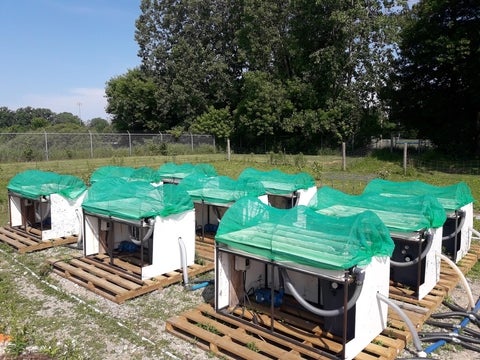

What is TRESS?
Opened in 2015, TRESS is a collaboration between the University of Waterloo, the City of London, and the Upper Thames River Conservation Authority. The goal of TRESS is to enable cutting-edge research on the response of river ecosystems to common contaminants that can inform policy aimed at the protection, enhancement and management of river systems. Located in the city of London, Ontario at the Adelaide Pollution Control Plant near Western University TRESS is a unique resource for water research and educational activities.
TRESS is an outdoor artificial stream facility that enables controlled experiments on simulated whole stream ecosystems. The artificial streams at TRESS consist of a series of fabricated river channels over 7 m, 20 cm in width and 10 cm deep that hold over 150 litres of water. The facility’s water is sourced from Lake Huron through the City of London drinking water system. This water supply is extremely low in contaminants and serves as the reference state for the facility. A series of dosing pumps to each channel allow for precisely controlled delivery of contaminants at the desired experimental treatment concentrations. Likewise, a wide range of flow rates in the channels can be controlled by the researcher. The channels at TRESS can hold realistic stream substrates from fine sediments to small cobbles allowing for simulation of a variety of stream types. The physicochemical conditions simulated by TRESS enables research on whole communities from microbes, plants and small animals making TRESS one of the few facilities in the world that can study ecosystem processes in a controlled but realistic stream setting.
Director: Dr. Adam G. Yates PhD, Associate Professor, Department of Biology, University of Waterloo